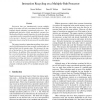Free Online Productivity Tools
i2Speak
i2Symbol
i2OCR
iTex2Img
iWeb2Print
iWeb2Shot
i2Type
iPdf2Split
iPdf2Merge
i2Bopomofo
i2Arabic
i2Style
i2Image
i2PDF
iLatex2Rtf
Sci2ools
HPCA
1999
IEEE
1999
IEEE
Instruction Recycling on a Multiple-Path Processor
Processors that can simultaneously execute multiple paths of execution will only exacerbate the fetch bandwidth problem already plaguing conventional processors. On a multiple-path processor, which speculatively executes less likely paths of hard-to-predict branches, the work done along a speculative path is normally discarded if that path is found to be incorrect. Instead, it can be beneficial to keep these instruction traces stored in the processor for possible future use. This paper introduces instruction recycling, where previously decoded instructions from recently executed paths are injected back into the rename stage. This increases the supply of instructions to the execution pipeline and decreases fetch latency. In addition, if the operands have not changed for a recycled instruction, the instruction can bypass the issue and execution stages, benefiting from instruction reuse. Instruction recycling and reuse are examined for a simultaneous multithreading architecture with mult...
Distributed And Parallel Computing | HPCA 1999 | Instruction | Instruction Recycling | Multiple Path |
| Added | 03 Aug 2010 |
| Updated | 03 Aug 2010 |
| Type | Conference |
| Year | 1999 |
| Where | HPCA |
| Authors | Steven Wallace, Dean M. Tullsen, Brad Calder |
Comments (0)

